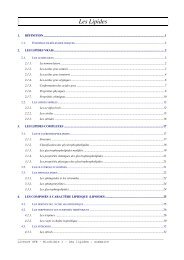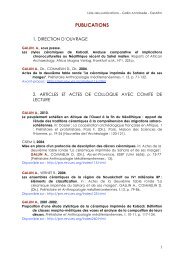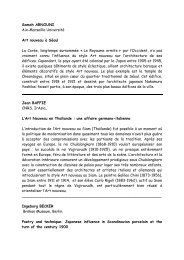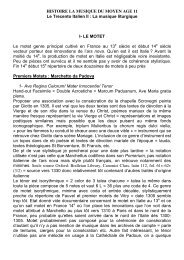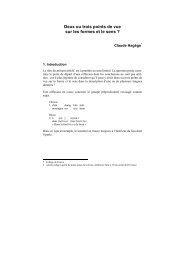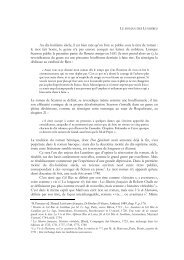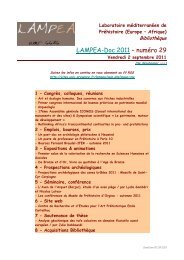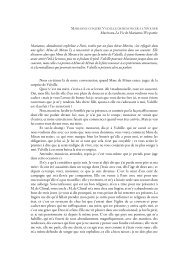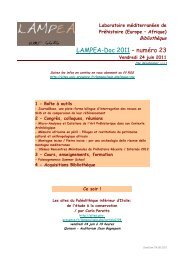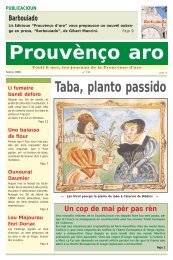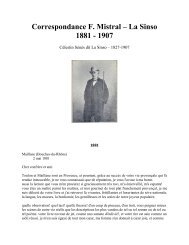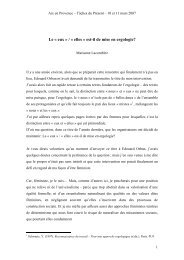le traitement cognitif des expressions idiomatiques. - Université de ...
le traitement cognitif des expressions idiomatiques. - Université de ...
le traitement cognitif des expressions idiomatiques. - Université de ...
You also want an ePaper? Increase the reach of your titles
YUMPU automatically turns print PDFs into web optimized ePapers that Google loves.
page 25<br />
contextuel<strong>le</strong> et chaque proposition contextuel<strong>le</strong> induit, soit l'interprétation littéra<strong>le</strong>, soit<br />
l'interprétation idiomatique (voir <strong>le</strong> tab<strong>le</strong>au 6).<br />
Tab<strong>le</strong>au 6: Exemp<strong>le</strong> <strong>de</strong> matériel utilisé par Titone et Connine (1994b).<br />
Idiomes non décomposab<strong>le</strong>s<br />
Contexte Dominant<br />
1.1. She finally kick the bucket, after being ill for months.<br />
1.2. After being ill for months, she finally kick the bucket.<br />
Contexte Subordonné<br />
1.3. She finally kick the bucket, forgetting to move it from the path.<br />
1.4. Forgetting to move it from the path, she finally kick the bucket.<br />
Idiomes décomposab<strong>le</strong>s<br />
Contexte Dominant<br />
2.1. He tried to save his skin, by getting his work done on time.<br />
2.2. By getting his work done on time, He tried to save his skin.<br />
Contexte Subordonné<br />
2.3. He tried to save his skin, by avoiding the tanning salons.<br />
2.4. By avoiding the tanning salon, he tried to save his skin.<br />
Les sujets lisent une série <strong>de</strong> 24 phrases incluant <strong><strong>de</strong>s</strong> <strong>expressions</strong> <strong>idiomatiques</strong> et non<br />
<strong>idiomatiques</strong>. Les mouvements <strong>de</strong> yeux sont enregistrés et <strong>le</strong>s temps <strong>de</strong> <strong>le</strong>cture par caractère<br />
étaient calculés (durées <strong><strong>de</strong>s</strong> premières fixations et régressions à l'intérieur du même mot) pour<br />
chacune <strong><strong>de</strong>s</strong> trois zones <strong>de</strong> la phrase: région <strong>de</strong> l'idiome, <strong>de</strong>rnier mot <strong>de</strong> l'idiome et région <strong>de</strong><br />
désambiguïsation. Les résultats obtenus sont présentés dans <strong>le</strong> tab<strong>le</strong>au 7.<br />
Tab<strong>le</strong>au 7: Temps moyens <strong>de</strong> <strong>le</strong>cture <strong>de</strong> la région <strong>de</strong> l'idiome, du <strong>de</strong>rnier mot <strong>de</strong> l'idiome et <strong>de</strong><br />
la région <strong>de</strong> désambiguïsation en fonction du contexte, dominant ou subordonné, et <strong>de</strong> sa<br />
position, avant ou après l'idiome, pour <strong>le</strong>s idiomes non décomposab<strong>le</strong>s et <strong>le</strong>s idiomes<br />
décomposab<strong>le</strong>s (d'après Titone et Connine, 1994b, p.12).<br />
Idiomes Non décomposab<strong>le</strong>s<br />
Contexte Dominant<br />
1.1. She finally kick the bucket, after being ill for months.<br />
51 62 45<br />
Idiome Dernier mot <strong>de</strong> l'idiome Région <strong>de</strong> désambiguïsation<br />
Contexte Subordonné<br />
1.3. She finally kick the bucket, forgetting to move it from the path.<br />
49 59 49<br />
Idiome Dernier mot <strong>de</strong> l'idiome Région <strong>de</strong> désambiguïsation<br />
_______________________________________________________________<br />
Contexte Dominant<br />
1.2. After being ill for months, she finally kick the bucket.<br />
44 69 88<br />
Région <strong>de</strong> désambiguïsation Idiome Dernier mot <strong>de</strong> l'idiome<br />
Contexte Subordonné<br />
1.4. Forgetting to move it from the path, she finally kick the bucket.<br />
45 61 80<br />
Région <strong>de</strong> désambiguïsation Idiome Dernier mot <strong>de</strong> l'idiome<br />
Guy Denhière & Jean-Clau<strong>de</strong> Verstiggel



